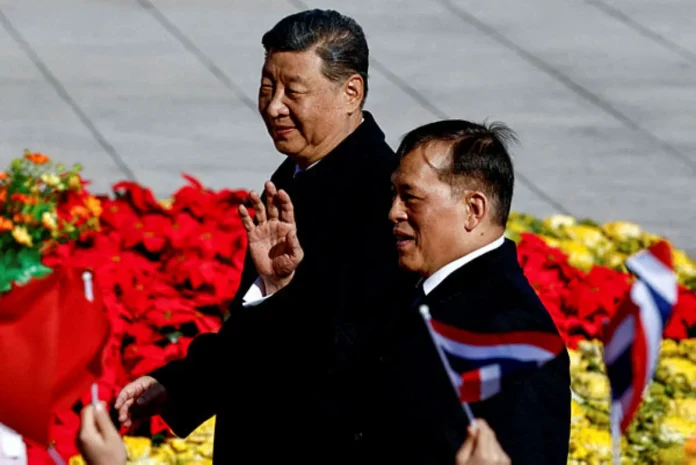China welcomes Thai King Vajiralongkorn’s first official visit, highlighting economic cooperation and positioning itself as a stable regional partner.
BEIJING: Chinese leader Xi Jinping on Friday rolled out the red carpet for the first Thai monarch to visit China since ties were established 50 years ago, seizing the chance to portray his nation as a benevolent neighbour and reliable economic partner.
The arrival of Thailand’s King Maha Vajiralongkorn and Queen Suthida, and a visit earlier this week by Spain’s King Felipe VI and Queen Letizia, have been depicted by Chinese media as the outcome of friendly coexistence and a signal to other nations that China is trustworthy, and as drawing a stark contrast to the economic unease set off by U.S. President Donald Trump and his sharp tariff hikes this year.
Bilateral ties have evolved significantly since Thailand, firmly aligned with the United States against communism during the Cold War, viewed China as a threat.
ALSO READ: ASEAN and China strengthen food security and trade cooperation
Vajiralongkorn travelled to China once in 1987 as Crown Prince, sent by his father, who never visited despite invitations from Beijing. Since the 1980s, the relationship between the two countries has strengthened, anchored by deep trade and investment links.
China is a top source of visitors for Thailand’s vital tourism sector and a major investor in industries such as automobiles.
Thailand bought $80 billion of goods from China last year. Xi told Vajiralongkorn in a meeting that China is ready to strengthen strategic coordination and enhance cooperation on major projects, including a railway connecting the countries, according to China’s official Xinhua news agency.
Xi also broached the topic of trade particularly regarding increasing Thai agricultural exports to China.
In an editorial, Xinhua portrayed historical trade and exchanges with Thailand from thousands of years ago as a basis on which future bilateral ties should be built.
“Before the large-scale entry of Western colonists, most of Thailand’s foreign trade was sold to China,” Xinhua said on Thursday, listing Thai rice, spices and tin ore traded for Chinese porcelain, silk, tea and ironware. A few years before diplomatic ties were established, Thailand had also sent table tennis players for a championship in China and Beijing provided crude oil in 1974 to help Bangkok tide over economic difficulties, Xinhua said.
“The visit gives China a chance not only to reaffirm its closeness with the (Thai) Kingdom, but also to signal its continued regional relevance at a time when U.S. influence is visibly receding,” said Juliette Loesch, a researcher at Paris-based Inalco.
“It comes just two weeks after Donald Trump’s brief stop at the ASEAN Summit, where his visit’s only visible outcome was his role in overseeing the signing of the short-lived peace declaration between Thailand and Cambodia. By contrast, China announced the deepening of its free-trade agreement with ASEAN.”
MUTUAL ECONOMIC SECURITY
Trade pressures from the West are also driving China’s pursuit of closer economic ties with its neighbours as the world’s largest manufacturer sets out to find new markets for products it is struggling to sell. This week, the European Union agreed to impose customs duties on low-value parcels as soon as next year, a crackdown on cheap Chinese e-commerce goods and likely to impact Chinese online retailers Shein and Temu.
But China’s smaller-economy neighbours have less room to be picky with the biggest trade partner in their region. Like other Southeast Asian countries, Thailand is concerned with Beijing’s intentions but it recognises the reality of China’s rising power, Professor Steve Tsang, the director of London-based SOAS China Institute said.
“With Trump making the U.S. no longer reliable as an ally, it is even more important that Thailand engages effectively with China,” he said. Still, “Beijing has not reassured most Southeast Asian countries, including Thailand, that they have nothing to worry about with China’s rise.” – Reuters








